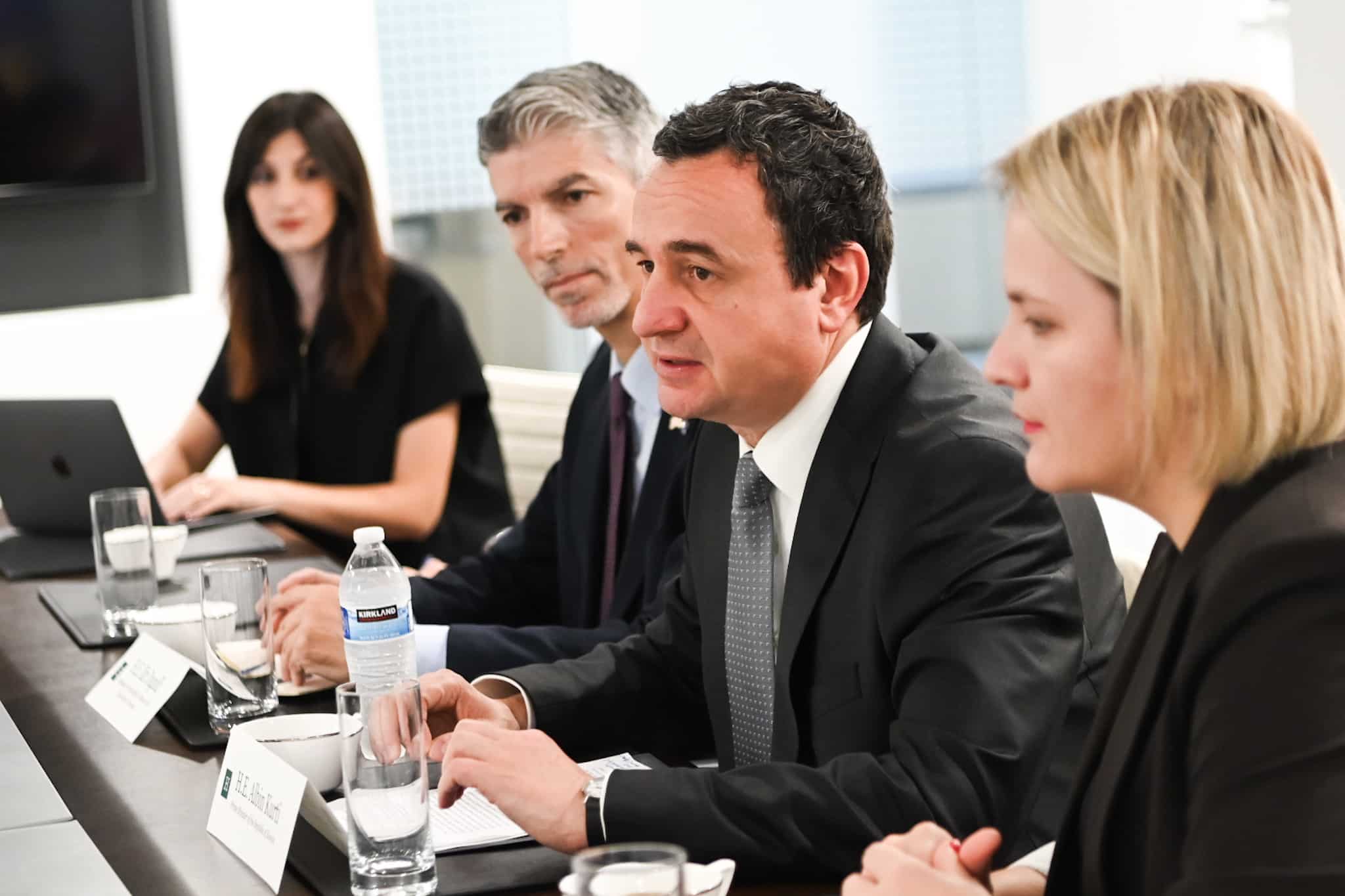Washington D.C., USA, 29 September, 2025
Thank you for the opportunity to be here and to engage in this important discussion on the evolving strategic partnership between Kosova and the United States. I will focus my remarks on two areas of central importance: defense cooperation and development collaboration. But before turning to current policy, it is important to recall the foundations of our alignment.
In 1999, NATO launched Operation Allied Force to halt mass atrocities and genocide carried out by the Milošević regime in Kosova. Over 78 days, NATO conducted more than 38,000 sorties, compelling the withdrawal of Serbian forces and creating the conditions for international administration and Kosova’s democratic transition. For our people, this was liberation — the decisive moment when the path to freedom opened. NATO is part of Kosova’s political DNA. Those atrocities were visible to the world. Images of massacres, burned villages, and mass expulsions could not be denied. Nearly one million Albanians were expelled from Kosova, and the brutality was broadcast as it unfolded. This visibility galvanized NATO’s decision to act — for Europe’s stability and out of moral responsibility. The United States led this act of responsibility, supported across party lines: President Bill Clinton in 1999, and later President George W. Bush in 2007, when he declared U.S. support for Kosova’s independence.
Kosova today is not simply a post-conflict state under NATO protection. It is a trusted ally and a security contributor. Over the past four years, more than one thousand members of the Kosova Security Force have trained in U.S. programs, including West Point and the U.S. Army War College. In 2021, a KSF unit deployed alongside the Iowa National Guard in Kuwait under Operation Inherent Resolve — our first international peacekeeping mission. We have hosted three consecutive editions of Defender Europe, most recently with the 28th Infantry Division headquartered in Kosova.
Our defense spending reflects this transformation. We have quadrupled our defense budget during our term, with almost all of the additional budget going to new systems. Among these acquisitions are Javelin anti-tank systems, UAVs, ASVs, as well as a complete restocking of our military with new small arms, and discussions are ongoing for acquisition of Black Hawk helicopters. We have also signed the Agreement on the Protection of Classified Information and CISMOA, becoming the 33rd country globally with this trusted status. Our cooperation extends to supporting Ukraine: we have trained Ukrainian personnel, donated equipment, joined Operation Interflex in the UK, and imposed sanctions against Russia, Belarus, Iran, and Hezbollah.
Defense is only one part of the story. Our partnership is built on three pillars: diplomacy, defense, and development. On diplomacy, we occasionally face differences, especially regarding Serbia and the illegal structures it maintains in Kosova. But these differences are about tactics and operations, not about values or strategic goals. On those we are fully aligned. On development, the progress is equally significant.
My government unilaterally reduced to 0% import tariffs for all US made goods, strengthening our commercial ties and further incentivising American investments. The United States advanced the Millennium Challenge Corporation Compact with Kosova — the largest U.S. grant in our history, over 200 million USD. Its focus on battery energy storage will modernize our energy sector, help to reduce imports and to integrate new renewables, and ensure long-term resilience. Meanwhile, General Electric yesterday completed modernisation of one of the units of our main power plant Kosova B, to continue work in the other unit next year. This is development policy, but also energy security.
Kosova has responded positively to U.S. requests in other areas, including hosting up to 50 third-country nationals temporarily in 2025, in line with international humanitarian standards. This demonstrated our readiness to support shared global priorities.
All of this takes place in a complex regional environment. President Putin is betting on Western disunity. President Vučić in Belgrade is playing for time, exploiting divisions between EU institutions and member states while refusing to sanction Russia and maintaining close security and economic ties with Moscow. Weekly criticism of his regime rarely translates into decisive EU action. At the same time, narratives circulate in Serbia and beyond portraying leaders like Xi Jinping and Vladimir Putin as preferable to Western democratic models. This rhetoric revives the old notion of “non-alignment,” but in practice it means hedging under multiple umbrellas until the moment is ripe for destabilizing moves in pursuit of a Greater Serbia. Domestically, Serbian authorities dismiss civic actors and protesters as “puppets of Western NGOs,” language that echoes Lukashenko’s methods and seeks to delegitimize independent civil society. These trends are dangerous. A Russian victory in Ukraine would embolden revisionist ambitions in Montenegro, Bosnia and Herzegovina, and Kosova.
Against this backdrop, Kosova is a first line of defense against malign influence. Our institutions are resilient, transparent, and closely aligned with Western partners. With Camp Bondsteel, the continued presence of KFOR, and our growing bilateral cooperation with the United States, Kosova is a stabilizing force in Southeast Europe. For these reasons, we cannot be passive. Our alignment with the United States and NATO is principled and pragmatic.
We impose sanctions when required, support Ukraine, strengthen our defense, and build sustainable development. Differences with Washington may arise on tactical questions, but on strategy and values we are fully aligned. The direction is clear: Kosova and the United States are united in interests and advancing together toward shared goals.
Kosova is not asking to be seen only as a beneficiary of NATO and U.S. support. We are a security provider, a development partner, or a steadfast ally. In a region where Russian influence exploits divisions, Kosova stands firmly with the United States — in words, in policies, and in action. I look forward to today’s discussion on how we can deepen this cooperation further, in defense, in development, and in ensuring lasting security for the Western Balkans.
Thank you.


